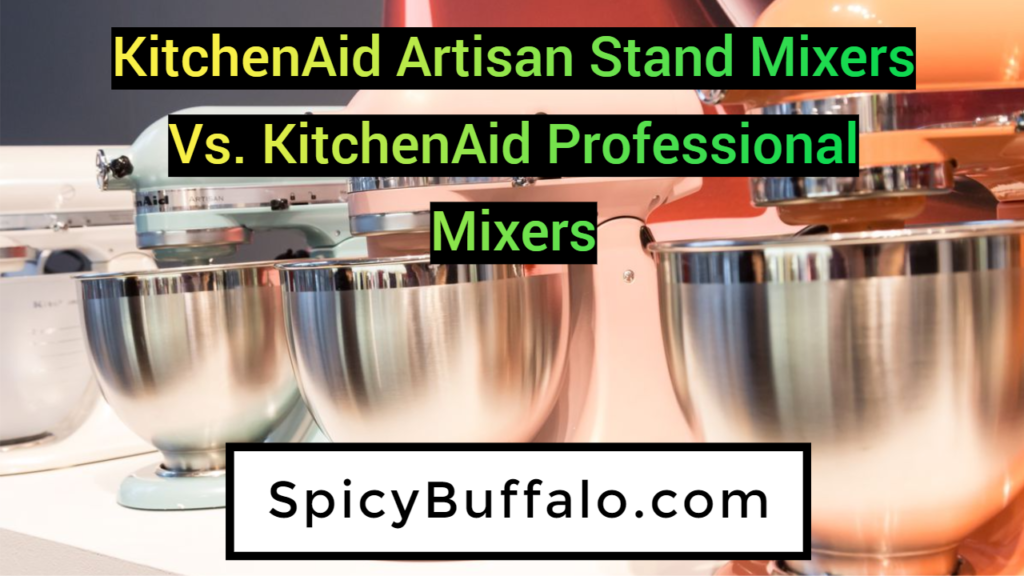
For a long time now, KitchenAid has been known for their high-quality stand mixers. And while that’s not likely to change any time soon, they’re also now expanding their line of professional-grade stand mixers! Whether you’re looking for the best mixer for your personal kitchen or a commercial mixer with enough power to run an ice cream business, KitchenAid has what you need.
If you read on, we’ll go over the key differences between these two versions of KitchenAid’s workhorse product — and help you figure out which one is right for your needs.
The Original Series
The original series of KitchenAid Artisan stand mixers has a 10-speed all-metal transmission that’s built to last, with a powerful 325-watt motor that runs on 110 or 220 volts. The Glass bowl is 5 quarts and the Wire whip attachment allows for more complete mixing, even at higher speeds. This model has a tilt-back locking head for easy access, as well as an included pouring shield.
The Professional Series
The professional series KitchenAid Artisan stand mixer is identical in every way to the original, but has a few improvements: 8 speeds instead of 10 and the option for an additional ice cream attachment. They also have more color options than the original.
The Other Differences
Let’s discuss the main differences between these two models. First, Glass vs. Plastic: The original series has a glass bowl and the Professional Series has a plastic bowl. KitchenAid discusses the differences between their products here, but don’t let this confuse you because the principles are the same for each: Glass bowls have more “workability” and are more durable, but are also heavier and more expensive. While that’s hardly a big deal, I’ll just assume it means you’re looking for something heavy duty (and good quality) at home, as opposed to commercial use.
Second is speed: The Professional Series has 8 speeds while they both have 10 speeds in common. While 8 speeds is really enough to get the job done (and more than you’d ever probably need), 10 speeds gives you a little more leeway.
Finally, mixing power: Both products have 325-watt motors, but the Professional Series offers an extra ice cream attachment. So depending on your needs, this could be a factor for you.
Overall, the biggest difference between these Artisan models is the additional speed and versatility of the Professional series at a slightly higher price point — but only if you need those added features. For example, if you just want one mixer to use at home or in your restaurant or business, then go with either one.
Frequently Asked Questions:
What are the best attachments for KitchenAid stand mixers?
Any of the following four: The Whisk, the Spiralizer, the Fruit & Vegetable strainer, and Liquid & Dry Measuring Cups. Those are all included in your purchase.
How much does it cost to ship a KitchenAid KSM150PSER Artisan Series 5-Qt. Stand Mixer Online?
It comes in at about $30 on average to send this online. But you have to check with your shipper because it could be different. Also, sometimes you can save if you buy additional items and pay for them together on the same receipt.
Does the KitchenAid Artisan Series stand mixer come in any other colors besides white?
There’s a limited number of colors available for purchase, but if you’re reading this after 2019 then the answer is yes — there are plenty of other colors! Here’s a list of those kitchenaid artisan mixers . That said, white will always be available too.
LED colors: Red, Black, Blue, Green, and Purple.
What are the differences between glass bowls and plastic bowls?
For a single bowl mixer (2-speed or 3-speed) like the KitchenAid KSM150PSER Artisan Series 7-Qt. Stand Mixer the glass bowl weighs approximately 8.3 pounds while the plastic bowl weighs approximately 4.9 pounds – a 9% difference in weight.
In comparison to classic metal or glass bowls with a stainless steel band that is typically made of steel, plastic is lighter in weight because it’s less dense than iron or steel. However, plastic bowls can chip, dent or break. So if you want a mixer that will last for years and years, a metal bowl is the answer.
How do I choose a mixer?
There are quite a few factors to take into account. Following is a quick summary of what you need to think about before making that choice.
Volume: As the capacity of the bowl increases, the motor needs to work harder. Therefore, if you’re planning on doing larger-scale baking and require more power, go for a larger mixer with a big bowl.
As the capacity of the bowl increases, the motor needs to work harder. Therefore, if you’re planning on doing larger-scale baking and require more power, go for a larger mixer with a big bowl. Power: If you have large quantities of dough or doughs that are high in water content (e.g. soft-style pizza doughs), you will want extra power to avoid overworking the motor.
If you have large quantities of dough or doughs that are high in water content (e.g. soft-style pizza doughs), you will want extra power to avoid overworking the motor. Speeds: The number of speeds required depends on the type of recipe and mixing – more speed settings means more versatility for your baking and mixing needs.
The number of speeds required depends on the type of recipe and mixing – more speed settings means more versatility for your baking and mixing needs.
Final Thoughts:
Make sure it is powerful enough to handle any recipe you might want to make.
Made from high quality chrome steel that is durable plastic with stainless steel band.
White color shows dent resistant and durability.
It’s a 5-quart mixing bowl with glass mixing bowl.









